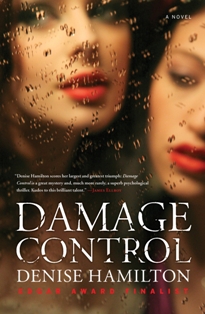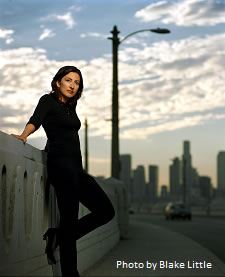
 Denise Hamilton is a writer-journalist whose work has appeared in the Los Angeles Times, Cosmopolitan, and The New York Times and is the author of five acclaimed Eve Diamond crime novels, PRISONERS OF MEMORY, SAVAGE GARDEN, LAST LULLABY, SUGAR SKULL, and THE JASMINE TRADE, all of which have been Los Angeles Times bestsellers. She is also the editor of and a contributor to the short story anthology Los Angeles Noir, winner of the Southern California Independent Booksellers Association Award for Best Mystery of 2007. She lives in Los Angeles with her husband and two young children. Here she talks about the Russian heritage that her mother tried to keep hidden, and the book that helped her family confront it.
Denise Hamilton is a writer-journalist whose work has appeared in the Los Angeles Times, Cosmopolitan, and The New York Times and is the author of five acclaimed Eve Diamond crime novels, PRISONERS OF MEMORY, SAVAGE GARDEN, LAST LULLABY, SUGAR SKULL, and THE JASMINE TRADE, all of which have been Los Angeles Times bestsellers. She is also the editor of and a contributor to the short story anthology Los Angeles Noir, winner of the Southern California Independent Booksellers Association Award for Best Mystery of 2007. She lives in Los Angeles with her husband and two young children. Here she talks about the Russian heritage that her mother tried to keep hidden, and the book that helped her family confront it.
My mother was always secretive about her Russian heritage, preferring to tell people that she was French. This wasn’t a lie: she’d been born in Nice, France in 1920 to a Franco-Russian family that had fled St. Petersburg during the Revolution.
Maman spoke French to us at home but switched to Russian with relatives, especially when there was adult business to be discussed.
Still, I knew that Slavic blood ran through my veins, that Tante Sanya had danced in the Mariinsky Theatre, that two of her sisters had starved to death during the siege of Leningrad, that others disappeared behind the Iron Curtain. In short, I knew Communism was a dangerous and evil force that had torn my family apart. Despite being a U.S. citizen, my mother never stopped fearing the KGB. Her Cold War paranoia was so deeply ingrained that she wouldn’t speak Russian in public, wouldn’t visit Russian Orthodox churches, and wouldn’t allow us to learn Russian.
I picked up quickly, as children do, that the subject of Russia was off-limits. Little wonder then, that this country which struck such fear into my formidable mother slowly began to obsess me.
Then one day after high school, I was browsing in my local bookstore --- Dutton’s --- when I spied a book that stopped me dead.
It was called THE RUSSIANS, by a New York Times correspondent named Hedrick Smith.
Warily, I picked it up and began reading. Immediately, a thought glimmered. Here was a key that might unlock my mother’s past, a Rosetta Stone to unravel all her half-truths and obfuscations. This book described the lives of Russians inside the Iron Curtain. How brave Hedrick Smith must have been to live there! Wasn’t he afraid of getting sent to a gulag?
I realized I had to buy this book and give it to my mother for Christmas. Then I could read it too and we could talk and I’d finally screw up the courage to ask the questions that had burned inside me for years. There was also a certain frisson here: If my grandparents hadn’t fled in 1920, I’d be one of the people in this book, doomed to live out my life in a grim socialist state.
When she opened my gift that year, my mother stared at the book in her hands, her face taking on the implacable mask it often did when she wanted to hide emotion.
Then she smoothed out the wrapping paper and folded it neatly (we were a frugal family), thanked me, and went on to the next present.
In the following weeks, she said nothing more, but I caught her reading it with great avidity. Then she passed it on to my dad, saying that unlike many American journalists, Smith had not let the Soviets bamboozle him. It was her highest praise.
Over Christmas vacation, I devoured the book too. It was like samizdat to me, and I wondered if any of the people Smith interviewed were my long-lost cousins or great grand nephews.
Slowly, I began asking more questions about my mother’s Russian past and something inside her seemed to thaw. We began to seek out and discuss other works by Russian authors, émigrés, defectors and spies.
But old habits died hard. In the late 1980s, I won a journalism fellowship to Budapest. Full of excitement, I raced home to tell my parents.
“But you can’t go,” my mother said, and began to cry. “Hungary is behind the Iron Curtain. The KGB could find you and put you in a camp.”
“Mom,” I said, exasperated. “It’s glasnost now. Everything’s different.”
“Only on the surface,” she said, her eyes narrowing.
Although I didn’t agree, I understood how deep her fear went and how it had colored her entire life.
Eventually, I covered the collapse of the regime my mother so loathed. I’m happy she lived to see the day.
My mother died in January at age 90, and this marks the first Christmas she won’t be with us. When my siblings and I settled her estate, the Russia books went to me, the only child who’d actually set foot in her ancestral homeland.
I’ve just pulled THE RUSSIANS from my shelves. It’s a hardcover, which means I sprang for the big bucks when I bought that present so long ago.
So here it sits, a memento of my dear mother, and a Christmas long ago.
Dosvedanya, Helene! Ya tebya lubliu.
Read more about Denise Hamilton on her website www.denisehamilton.com


